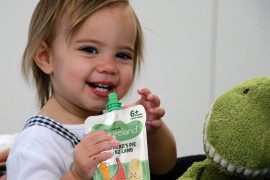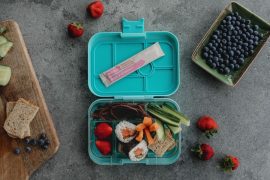Key nutrients that are transferred to breast milk
Another key topic in regard to your diet while breastfeeding is that there are several nutrients in mum’s milk that are dependent on it. For example, vitamin A, water-soluble vitamins such as vitamin B1, B2, B3, B6, vitamin B12; iodine, selenium, vitamin D and choline, as well as fatty acids such as DHA, which are key nutrients for neurological and eye development of the baby.
What are the best foods to eat while breastfeeding?
You can eat most foods while breastfeeding, you just need to do your best to follow a balanced diet, similar to when you were pregnant. You can obtain the extra energy and nutrients needed by eating slightly more of the same foods you already used to eat during pregnancy.
Vitamin D: This is an essential micronutrient for bone health and metabolism. Sunlight exposure is the best source to synthesise vitamin D. Very few food products are a good source of vitamin D, but you can obtain some vitamin D from foods like dairy products, fatty fish, animal fats of pastured animals, liver and egg yolks. Given the few dietary sources, lack of sun exposure in some parts of the world, and/or covering up due to skin cancer concerns or religious/cultural practices, makes vitamin D deficiency very common among people and supplementation is required in almost all cases in order to meet the body’s need. If a breastfeeding mum has low vitamin D stores from pregnancy, she might not pass on enough vitamin D to her baby. This is why some authors have proposed to supplement newborns with the vitamin. Exposure to sunlight will also influence the baby’s vitamin D stores.
Choline: is just as important as its cousin, folate, and has a key role in central nervous system development, brain development and cognition. You can include choline in your diet by eating eggs, liver, salmon, broccoli, kidney beans, brussels sprouts.

Group B vitamins: This is a very big and also essential group of vitamins. They are in charge of multiple functions within our bodies. Inadequate intakes of these B-group vitamins can result in growth retardation. Luckily, B-vitamins are found in lots of foods, from animal and vegetable foods, however vitamin B12 is the only one found in animal sources. This is why vegan or vegetarian mums must take a supplement of the active form of vitamin B12.
Omega-3 fatty acids: Fat is the most variable component of breast milk and it has important functions for your child’s health. It is considered one of the most important nutrients of human milk and is used to provide energy for the breastfed infant. Omega-3 has a crucial role in the growth and function of nervous tissue, brain and eye development, cognitive function and behaviour. There are very good sources of healthy fats such as fish (like salmon, trout or sardines), olive oil, avocado, nuts, and seeds.
Vitamin A: Vitamin A has many functions in the human body, in growth and development, antioxidant and immune function, which highlights the importance of this vitamin in mum’s and baby’s health. Liver and organ meats are incredible and safe sources of this micronutrient. However, care is needed when taking synthetic vitamin A supplements as it has been linked to birth defects at high doses. Talk to your APD Women’s Health Dietitian if you need supplements.
Iodine: Iodine is a mineral not only important for woman’s thyroid health, but also for a newborn’s health. Sources of dietary iodine include iodised salt, dairy foods, and bread dough.
Mum, as you just read, there are several nutrients that are important while you are breastfeeding. These are essential not only for your newborn but also for your own health and recovery after labour. However, these nutrients are widely found amongst all food groups, so, as long as you eat a healthy and balanced diet, and avoid unhealthy and unnecessary restrictions in your diet, you’re going to meet most of your nutrient requirements. However, due to the high demand for nutrients during this time, some nutrients may need to be boosted with supplements. It is important to follow up with an Accredited Practicing Dietitian, such as Kristy from Growth Spectrum to ensure you are replenishing your nutrient stores from pregnancy, delivery and breastfeeding and meeting your requirements.
Recommendations for mums:
- Include a wide variety of healthy foods, trying to choose nutrient-dense foods
- Continue taking your prenatal vitamins and check you’re taking an appropriate supplement (Ask your APD Women’s Health Dietitian)
- Remember that this is not a stage to go on fad diets
- If you follow a vegan diet, it’s especially important to choose foods that will give you the nutrients you need and replace with foods high in nutrients you usually find in animal foods.
To learn more or to get in touch, visit the Growth Spectrum website, and join the supportive Growth Spectrum Facebook and Instagram communities.










